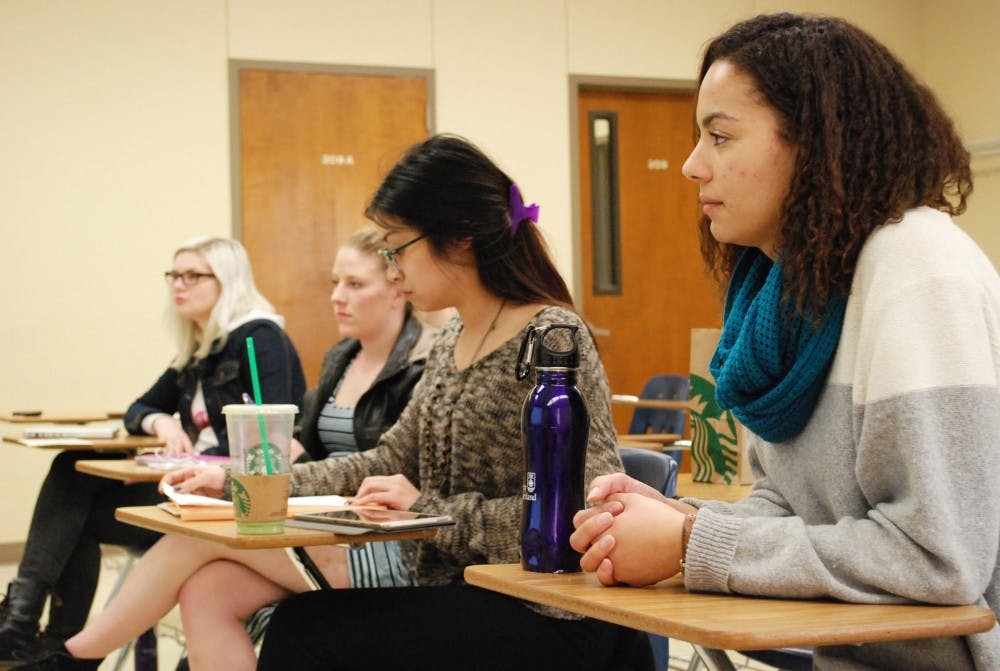Christine Menges |
Making its way onto protest signs and social media hashtags, the rallying cry “Black Lives Matter” has become a nationwide slogan protesting what many people see as police brutality against people of color. The shooting of Michael Brown, the choking of Eric Garner and the non-indictments of the officers involved in these events spurred the formation of a hashtag and the movement.
Now, this refrain is the title of a newly-formed campus group, BlackLivesMatter@UP.
The movement began with an email. Alexandra Hill, professor of German studies, and Lara Trout, professor of philosophy, are concerned about police brutality against people of color, and wanted to invite University and community members together for a discussion.
They sent an email to student leaders, professors and other members of the community inviting them to a planning meeting.
Mikayla Posey, secretary of Black Student Union, summarized the mission the group created during their first meeting three weeks ago.
“We want to make sure that all people are respected, valued and celebrated on campus, and in our larger community,” Posey said.
BlackLivesMatter@UP hopes to start conversations about race on a large scale at UP during Diversity Dialogues Week.
Junior Jill Pham, who is starting an Asian American Student Union, said that at the beginning of the week, the group will set up booths in high-traffic areas with posters titled “Whose Lives Matter?” to educate students on diversity issues at UP. She hopes that by doing so, the issue will become more concrete to students.
“This is really an effort to reach out to other people, and make it so that it’s everyone’s problem,” Pham said.
In addition to the informational booths, the group has planned to have a panel that will have a further dialogue about race issues.
Several members of BlackLivesMatter@UP mentioned the recent tasing of a black student from Roosevelt High School by police as a controversial topic they wanted discussed. Many of them said they want a representative from Roosevelt, as well as an officer from the Portland Police Bureau on the panel to discuss the incident.
For many students, this incident was one example of controversy happening close by that went unnoticed at UP.
“I think there’s this assumption that we live on this Bluff bubble, that these things don’t happen here, or they happen far away, and we tend not to discuss it,” Posey said.
Junior Grace Holmes, the director of the college readiness series at Roosevelt High School, has been aware of racial injustice since working for juvenile justice reform as a high school student in her home state of Nebraska.
Holmes remembers seeing young black children enter the courtroom in wrist and arm shackles, accused of crimes such as truancy. This experience inspired her to further pursue social justice causes. When she received the professors’ email, she saw another chance to make a difference.
Aside from her own efforts to promote awareness, Holmes hopes this movement will lead students to what she believes is another benefit of college: Learning about important topics outside of school.
Both Holmes and Posey said that it is critical to engage in social justice issues since one of the foundational beliefs of UP is to serve others.
“If we’re going to adopt that, we need to do a better job of empathizing with other people,” Holmes said.
Michael Brown and Eric Garner died from their injuries, and Holmes thinks that fact mandates greater participation in social justice reform. Holmes hopes that BlackLivesMatter@UP will accomplish something meaningful.
“The least we can do is have a discussion and a dialogue about it,” Holmes said.
Christine Menges is a reporter for The Beacon. You can reach her at Menges15@up.edu or on Twitter @ChristineyBird.








